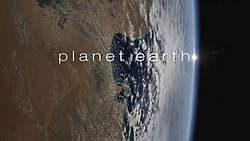Planet Earth (TV series)
| Planet Earth | |
|---|---|

Series title card from UK broadcast
|
|
| Genre | Nature documentary |
| Narrated by | David Attenborough |
| Composer(s) | George Fenton |
| Country of origin | United Kingdom |
| Original language(s) | English |
| No. of episodes | 11 |
| Production | |
| Executive producer(s) | Alastair Fothergill |
| Cinematography | Doug Allan |
| Running time | 60 minutes |
| Production company(s) |
BBC Natural History Unit Discovery Channel NHK |
| Release | |
| Original network |
BBC One BBC HD |
| Picture format |
16:9 576i (SDTV) 16:9 1080i (HDTV) |
| Audio format |
Stereo (SD) Dolby Digital (HD) |
| Original release | 5 March – 10 December 2006 |
| Chronology | |
| Followed by | Planet Earth II |
| Related shows |
The Blue Planet Frozen Planet |
| External links | |
| Website | |
Planet Earth is a landmark 2006 British television series produced by the BBC Natural History Unit. Five years in the making, it was the most expensive nature documentary series ever commissioned by the BBC and also the first to be filmed in high definition.
Planet Earth premiered on 5 March 2006 in the United Kingdom on BBC One, and by June 2007 had been shown in 130 countries. The original version was narrated by David Attenborough, whilst some international versions used alternative narrators.
The series has eleven episodes, each of which features a global overview of a different biome or habitat on Earth. At the end of each fifty-minute episode, a ten-minute featurette takes a behind-the-scenes look at the challenges of filming the series.
Ten years later, the BBC announced a six-part sequel had been commissioned, titled Planet Earth II, the first television series produced by the BBC in Ultra-high-definition (4K). David Attenborough returned as narrator and presenter.
In 2001 the BBC broadcast The Blue Planet, a landmark series on the natural history of the world's oceans. It received critical acclaim, high viewing figures, audience appreciation ratings, and many awards. It also became a hugely profitable global brand, eventually being sold to 150 countries worldwide. Feedback showed that audiences particularly liked the epic scale, the scenes of new and unusual species and the cinematic quality of the series. Programme commissioners were keen for a follow-up, so Alastair Fothergill decided that the Natural History Unit should repeat the formula with a series looking at the whole planet. The idea for Planet Earth was born, and the series was commissioned by Lorraine Heggessey, then Controller of BBC One, in January 2002.
...
Wikipedia
